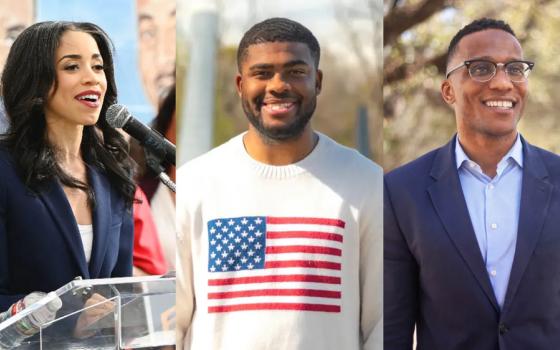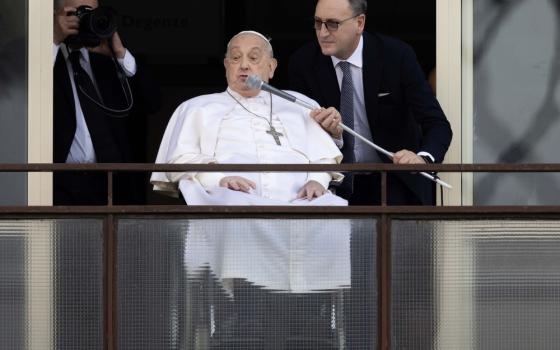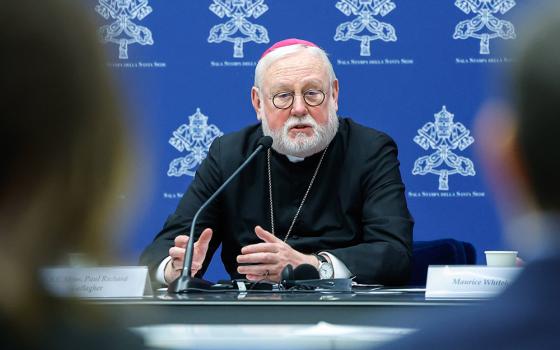
Christmas
For many years, Maryknoll Fr. Bob McCahill has been sending an annual letter to NCR and other friends at Christmastime, chronicling his experience living among the people of Bangladesh since 1975. Following is an edited version of his 2011 letter.
Dear Friends,
Skinny, awkward 6-year-old Bareek was brought to me by his skinny, worried mother. A doctor has diagnosed the boy’s cerebral palsy. I pledged to arrange a two-week course of physiotherapy so that mother could learn to help her son. On that very day, Haroon and I were hauling earth in baskets to lay as a foundation for my new house. Bareek decided to help us. In his family’s cooking shed he found a high-sided rice plate. Working alongside the men, Bareek filled his plate repeatedly, carried it 15 meters in his jerky gait, and emptied it wherever Haroon and I emptied our basketfuls. Neighbors who observed his voluntary efforts thought, pound for pound, Bareek was the most admirable of all the earth haulers.
Another 6-year-old -- my bicycle -- disappeared one morning from where I had parked it in front of the post office. A positive consequence of my loss was that I began to take more time to meet and converse with people in the town. One whom I searched for was Rotin, who works in the kitchen of the Das Restaurant making sweetmeats. I had been hoping to encounter Rotin in order to beg his pardon for my unintentionally rude behavior. Rotin the sweets maker readily pardoned me.
Bangladeshis observe that I walk fast and tease me about it. Without actually racing I normally out-stride the folks. However, there is one group I give way to: devout Muslims who are some distance from their neighborhood mosque when the call to prayer sounds. They take off, their faces set for the mosque.
We were sitting on the cement bench that spans the neighborhood canal when the topic turned, as usual, to religion. Five grown men and a few boys, all Muslims, listened when I claimed to have read a translation of the Quran. “What did you think of it?” asked one.
“I was glad I had read it,” I replied, “because it helped me understand your Islamic faith better.”
Another put a question to me they all had in their minds: “Was your heart moved by the Quran?”
As tactfully as possible I answered: “The Book did not stir me.” Silence descended on us. “However,” I continued, “that is to be expected. For I am a Christian, and the Bible nourishes my spirit. You are Muslims; the Quran nourishes you. We have different beliefs, but we are one family. We all belong to Allah.” Accepted.
Every year a seminarian is with me for one month. Hilarius and I bicycled together to distant villages. As we explained our intention to be of use to poor children in need of surgery, a villager declared to Hilarius with astonishment: “I did not know there are people like you.” Hilarius was impressed to glimpse how positively Muslims respond to compassion shown to their needy ones by Christians. Those Muslims, by their tolerance for our religion and appreciation for persons who live merciful lives, enable us to evangelize by our love for the poor.
Curious, 25-year-old Dulal conversed with me at the rice dealer’s store. “You mean to say you are keeping the Islamic 30 days fast?” he queried.
“Yes,” I replied, “for fasting is a good practice.”
“But you are a Christian, so why fast with Muslims?” he pressed.
I responded: “I do it in solidarity with Muslims, especially from sympathy for the hungry. It is something we can do together to bring us all closer to Allah and to one another.” Dulal nodded and went his way.
For drinking and cooking water I depend on my neighbor’s generosity to share use of their tube well pump. Once a day I draw 16 liters to use during 24 hours. One day while women and girls were using the pump for bathing, I needed water for cooking. Khaleda, a women having leadership qualities who lives near the water pump, seized my bucket, disappeared behind the curtain that shields the pump and bathers, and returned to me with the brim-filled bucket. It is no little thing for a Muslim woman to give a helping hand to a non-related male. The fact that I am twice her age does not mitigate the danger to her reputation. But it is a risk Khaleda was willing to take. May Allah continue to give her courage.
Several years ago I lived in another town where there were no Catholics, but I did get to know a solitary Christian named Popy, a tall, likeable, lonely, 30-ish fellow who lived with his widowed mother and watched lots of television. He was not married then. Recently I visited Popy, and as he and I sipped tea together he told me he had married. I congratulated him. Then, earnestly and directly, Popy informed me, “I converted to Islam and married a Muslim lady.” I urged him to say more, so he continued: “I only converted for the sake of marriage. I still believe as before.” Now he has a new Arabic name: Hasan. Popy, his nickname, had not changed. Nor, according to him, has his faith. I pray for my divided friend.
At a government hospital 50 kilometers from the town I met Rupa, a Christian nurse. Rupa is a fine example of a Christian living completely surrounded by Muslims and Hindus, performing her professional duties competently and contentedly. Although she would prefer to live among her own faith community she does not feel orphaned by the church merely because no other Christians live near the place she is assigned by the government. She seems to realize she is Christ’s outreach in that remote location. She blooms where she is planted.
Fraternally,
Bob
Stories in this series
|



